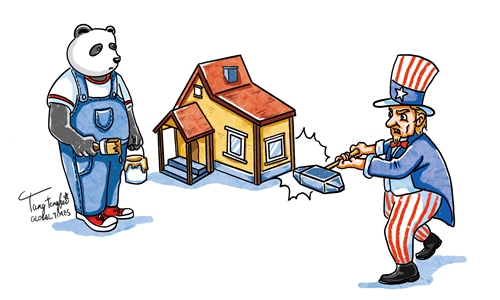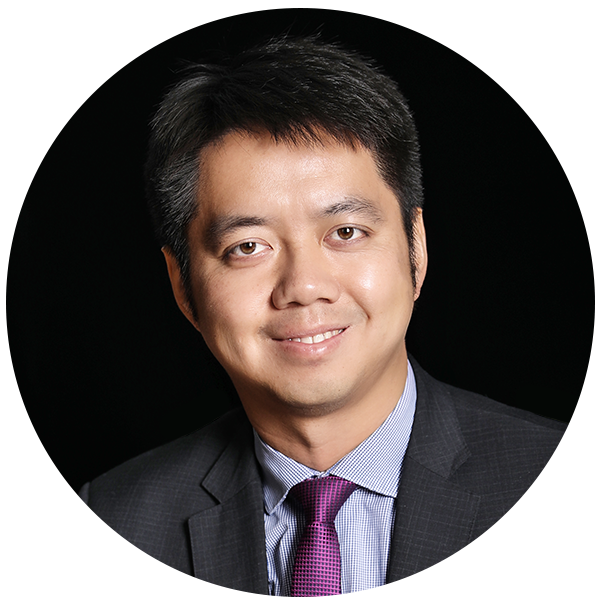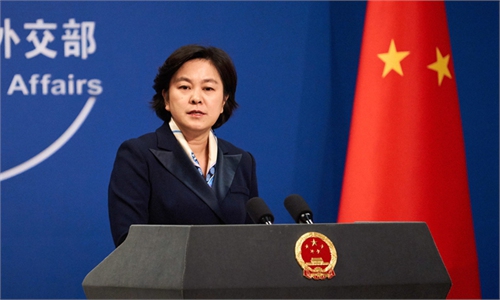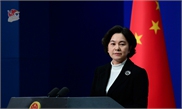China instills certainty into a chaotic world

Illustration: Tang Tengfei/GT
Chinese State Councilor and Foreign Minister Wang Yi delivered a speech to the China-US Think Tanks Media Forum on Thursday. As one of the organizers of the event, I attended the forum and was impressed by the huge amount of information he made in his remarks.Regrettably, US media outlets failed to adequately report about this most systematic explanation of China's US policy by Chinese policymakers since the deterioration of Beijing-Washington relations. I would therefore like to share my understanding of the speech to the English-speaking world through this column.
At the very beginning, Wang stressed that China-US relations face "the most severe challenge since the establishment of diplomatic ties." Since 1979, China-US relations have not deteriorated as comprehensively as they are now. As the leader of China's foreign policy circle, Wang called on China-US ties to get "back on track toward long-term, sound and steady development."
His proposals are very pragmatic with details.
Over the past 40 years, there have always been people in the US who have sought to change China's political system. They hope China will turn to a US model. Wang articulated, "China will not, and cannot, be another US," and that "China and the US should not seek to remodel each other. Instead, they must work together to find ways for the peaceful coexistence of different systems and civilizations." This is Chinese diplomacy's powerful response for the two countries' coexistence.
As far as I am concerned, China has sufficient goodwill toward peaceful coexistence with the US. China has never proactively provoked the US' core interests, sent its warships or fighter jets to the Caribbean Sea, driven a wedge in US ties with Mexico, Canada or Latin America, nor has China supported any political forces within the US. On the contrary, China has committed to maintaining the international system established by the US since the end of World War II.
Wang said, "China's US policy remains unchanged. We are still willing to grow China-US relations with goodwill and sincerity." This is China's firm commitment to the certainty of China-US ties. Keeping such policies is a major, positive factor amid current uncertainties.
Wang said, "it is important to have a correct view of the historical experience of China-US relations, and stay the course of dialogue and cooperation." When he made the remarks, I saw a heavyweight speaker from the US side give a thumbs-up. Wang made three suggestions for practical dialogues and cooperation. First, to activate and open all the channels of dialogue. Second, to review and agree on the lists of interactions. Third, to focus and cooperate on the COVID-19 response.
As seen from Wang's speech, it's not difficult to find that China wasn't irritated as the Soviet Union was in 1947 by the "Iron Curtain Speech." China has no intention to respond to the US with a new cold war. Contrary to the speeches respectively delivered by US Vice President Mike Pence and Secretary of State Mike Pompeo at the Hudson Institute, Wang's speech neither lied about the US nor attacked the country. It did not convey any hard-line gesture to coerce the US. It was full of wisdom that seeks recommendations for the healthy development of China-US relations and resolutions for problems.
Obviously, the Trump administration's strategy to shape China as an enemy won't succeed. Wang's address verified the conclusion of a recent questionnaire of 100 Chinese scholars completed by my institute.
In that questionnaire, 62 percent of those polled believe the US is waging a new cold war against China. But 82 percent hold the view that a new cold war resembling the US-Soviet Union Cold War is unlikely. Besides, 90 percent believe China is well prepared to handle a new cold war offensive launched by the US.
The US is pressing the accelerator to trash bilateral relations. But China is putting the brakes on with the hope of preventing China-US relations from continuing to plummet.
As Wang said, "Will the giant ship of China-US relations be able to stay on the right course in the future after more than four decades of voyage? The question matters not only to the interests of the Chinese and American peoples, but also to the future of the world and humanity."
That being said, to prevent the fall of China-US relations is to prevent the development of the world from further deteriorating. The coronavirus is still raging on. The peak of the pandemic has yet to come. In the global war with the virus, over 560,000 people have died. As I said in my column last week, the pessimistic estimate is that as many as 3.2 million people may die. If not united, humanity will likely enter a dark age. Americans should know that China is not the enemy, the virus is.
The author is professor and executive dean of Chongyang Institute for Financial Studies at Renmin University of China and executive director of China-US People-to-People Exchange Research Center. wangwen2013@ruc.edu.cn




